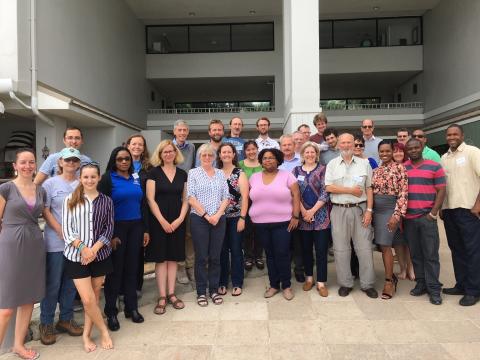Professor Helen Roy reports back from a workshop that she led alongside Centre for Ecology & Hydrology colleagues Jodey Peyton and Dr Oli Pescott on Grand Cayman last week. The event's purpose was to determine which invasive alien species were likely to arrive, establish and impact on biodiversity, ecosystems, human health and the economy across the Caribbean UK Overseas Territories within the next 10 years.
Invasive alien species (IAS) are considered one of the greatest threats to biodiversity, particularly through their interactions with other drivers of change. Horizon-scanning, the systematic examination of future potential threats and opportunities, leading to prioritisation of IAS threats is seen as an essential component of IAS management.
Through a UK Government-funded project led by the Non-Native Species Secretariat and - specifically for the horizon scanning component - the Centre for Ecology & Hydrology, we have convened experts from across the UK Overseas Territories (OTs) within the Caribbean to work with international experts to make predictions about which IAS were likely to arrive, establish and impact on biodiversity, ecosystems, human health and the economy within the next 10 years.
To achieve this, they used an approach which coupled consensus methods with rapid risk assessment.

The process involved two phases. The first phase was preliminary consultation with experts representing broad groups of species (plants, invertebrates, vertebrates and marine species) to derive ranked lists of potential IAS, and the second was a consensus-building workshop in which all the experts gathered to combine expert opinion with peer-reviewed scientific evidence to compile and rank the entire list of potential IAS for each of the impact categories across all UK OTs and specifically for each Caribbean OT.
The virtual pre-workshop phase and subsequent four days in Grand Cayman were hugely productive.
The enthusiasm and expertise of more than 40 experts collaboratively working together has enabled us to assess more than 2,000 species with the potential to arrive, establish and impact the Caribbean OTs. From these, we have derived priority lists of about 10-25 species in each impact category.
“Bringing together scientists from around the world to work with experts from the Caribbean UK OTs has been extremely useful in ensuring focus on invasive alien species management prioritises prevention as a key strategy. This forward looking approach is extremely important and the workshop has been an excellent step in informing the biosecurity process” - Dr Niall Moore, Chief Scientist at the Non-Native Species Secretariat
Links
Staff page of Professor Helen Roy
Staff page of Jodey Peyton
Staff page of Dr Oli Pescott
Additional information
The Non-Native Species Secretariat (NNSS) has responsibility for helping to co-ordinate the approach to invasive non-native species in Great Britain.
Our Twitter Moment rounds up tweets from the workshop.